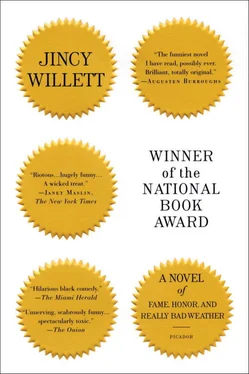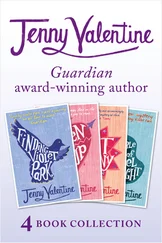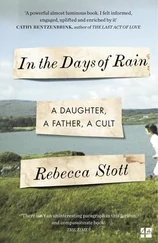My vandal is a tradition, like those parodies of defunct TV commercials that children sing. Kids born in 1978 chant:
It’s Howdy Doody Time
It isn’t worth a dime
Let’s turn to channel nine
And watch Frankenstein.
Somewhere in Frome even now a chalk-stained lad, forced indoors by panicking parents, stares wistfully out at the bruised sky and the dancing leaves and entertains himself with the sensuous memory of tiptoe stealth and the rugged feel of chalk on oak, and wonders, briefly, why he did it, and what DORK FROM ORK means. Who is Dork? Where is Ork?
Well, you little wretch, my name, for what it’s worth, is Dorcas Mather, Dork to the likes of you, and I come not from Ork but From Around Here. And while it’s thoughty of you to use chalk instead of aerosol auto paint, if I ever catch you breaking another of my windows and letting the weather in on my books, I will personally give you the sensuous memory of your unexamined young life.
First thing when I got here, I patched the window with the front cover of one of our older discards. Forever Amber. They don’t turn them out like that anymore. The cover is nice and thick, wrapped in good fabric, and just fits the pane.
When I was twelve, and An American Tragedy was my favorite summer book, my sister thrilled to Forever Amber, especially the scene where Amber, trying to rekindle the passion of Bruce Carleton, her first rapist, appears at the King’s Ball in a beaded gown that makes her breasts stand out “like full pointed globes.” I had to call Abigail “Amber” all that summer. She had been “Scarlett” the previous spring. Already Abigail was coming down in the world.
I spent my next hour reshelving, and the next thirty minutes straightening out the Mc’s and Mac’s. Nobody on God’s earth understands the Mc/Mac principle anymore. In order to do that, you have to be willing to think about something other than your genitals for a full minute. Nobody appreciates the horror of a good book dying on the wrong shelf. We have limited space here. We have to discard books that haven’t been checked out in four years. Four years!
What I was really doing, of course, was avoiding the new books, piled on the floor next to my desk. If T. R. hadn’t stampeded, along with the rest of the sheep—if she had catalogued the goddamn thing and put it on the new book shelf—I would have managed to avoid looking at it, until, dog-eared and shabby, it had been relegated to the 600 stacks and duly misshelved and swallowed whole.
Because then I could have looked away forever. Christ knows I am a disciplined person.
But today Pandora is toying with us, and so here I am, behind my desk, and in front of me is the world’s saltiest sandwich, a Styrofoam cup full of spiked coffee, and a brand-new copy of In the Driver’s Seat: The Abigail Mather Story, by Hilda DeVilbiss and Abigail Mather. Wrapped in fresh thick plastic, bordered in Squanto Brown.
My sister’s book is no longer a threat. It’s an object, with weight and color. Like my sister.
The cover is a ludicrous, unimaginative collage: the front grille of what looks like an Edsel, a pair of smashed glasses, the lower half of a screaming face belonging to a woman who bears no resemblance to my sister, and a “Police Report” of which only the first line ( Comments: battered wife ) is legible, although, having stared at it now for some time, I swear I can make out the first sketchy report of a Japanese sneak attack on our naval forces at Pearl Harbor.
The back cover confronts me, not with a snapshot of my sister’s big face, but with a list of advance raves from log-rollers in the wife abuse exposé biz. Here is a truly squalid practice for you, but it will work. It’ll sell, and not just locally, although God knows it’ll do good business here. In hardback even.
I was up all night reading this, literally riveted to the page. A true-life shocker which grabs you and never lets you go. Abigail Mather is a heroine for our times.
—Marj Wysocki, author of
Black Eye
…you will weep, you will tremble, you will cheer, and yes, you will laugh…incredible, horrifying, nauseating, and, ultimately, life-affirming and empowering. Abby Mather’s triumph is our triumph.
—Victoria Fracas, author of
Rape, Rape, Rape
Abigail’s story is by no means atypical. The only special thing about her marital horror is that she did something about it. This book should be required reading for every bride….
—June Bessette
Would you like to know who June Bessette is ? June Bessette is nobody . June Bessette is Abigail’s therapist . The only reason her credentials aren’t listed is that she only has a bachelor’s degree .
Move over, Joan of Arc! Step aside, Charlotte Corday! There is a newcomer to our pantheon of world-class heroines, and she is
I believe I’ll have a drink.
I don’t have the guts to read the blurb on the inside cover. The L of C cataloguing is mildly interesting: First of all, no index, since that’s the kind of slob Hilda DeVilbiss really is. Then:
1. DeVilbiss, Hilda. 2. Conjugal abuse. 3. True-life crime. 4. Biography—Lowe, Abigail Mather. 5. Regional—Frome, R.I. 6. Title.
I sort of like that. Regional—Frome, R.I.
Then we get the author’s modest encomium thanking everyone in Frome and New York City for enabling her to blah blah blah, especially my courageous, wonderful, funny sister. “Working closely with Abigail this past year,” Hilda gushes, “has been the most fulfilling learning experience I could possibly have had.” This I can believe.
There are three hundred and seventy-six pages here, which I will not read.
Yes I will.
There are sixteen pages of photographs, half in the front, half in the middle. There is our mother, recognizable only to us until this shameful moment, standing in the deep shade of the porch of the New Bedford house. You can see peeling paint, dusty ground. It looks like a slum. Whereas it’s really just an ordinary amateur snapshot of an ordinary house which was never intended for mass ogling goddamn you Abigail you rotten old babyfat bitch!
Beside her there’s Jabez, our father, a nice picture, his college picture, taken before he even met our mother, and running underneath them both, yoking them nicely, an educational caption informing us that “Jabez, whose mother died of tuberculosis when he was only five, grew up in an all-male world. His wife, Mattie, produced only the twins, and so his own family was all-female. The inevitable tragic results are all too predictable.”
The inevitable tragic results. I grow numb.
There I am on the porch swing with Abigail. We are six and complementary, as always. Her hair was so light then that you couldn’t get a shot of us together without one of us being poorly exposed. This is the one where I am a wizened gypsy in a navy collar middy and shorts, and Abigail beside me a white nimbus with eyes and a wide, camera-mugging smile, and some sort of flouncy dress, though even the dress pales into a dream cloud. How eloquent I look. How terrible to see irony clearly in the gaze of a six-year-old. A gypsy indeed, I look out into the future and give surprising comfort to my middle-aged self. This was always going to happen, says the child. You’ve had a lifetime to get ready for it. Don’t whine. I won’t. Even when I read the caption.
Dorcas remains a cipher. According to Abigail, “She knows me better than I know myself” but Dorcas refused, categorically, without explanation, to cooperate in the writing of this book.
It’s not such a great trick to see into the future. Take the next eight hours. I shall sit here and torture myself with this wretched artifact, and methodically self-medicate, which medicine should run out around noon. Before that, at approximately ten thirty, I shall start to feel its effects, and by eleven I shall have reached that stage where everything seems absurdly delightful and I have sudden cause for cheer. The cheap olive wall-to-wall indoor-outdoor carpeting they put down here last month will become interesting in texture and the colors of all my books, new and old, will sharpen up and give out a welcoming heat. The wind outside will pick up and sing to me in an enchanting way, and the sky will darken, brightening my lamps and overhead lights and it will seem, for a time, so fortunate, so, well, wonderful, to be alone on this day of days, riding out the storm in my beautiful little library. The whole show will seem to have been arranged for me. And if a window breaks, why, how exciting that will be. And if I trip and stumble, or spill booze on my desk, how droll. And as for the Book, the Excrescence, the Abomination…well, really, what the hell. Good for you, old girl. Pretty amusing, when you look at it the right way. Ha ha ha.
Читать дальше












